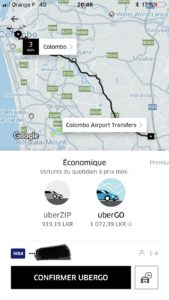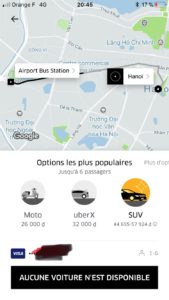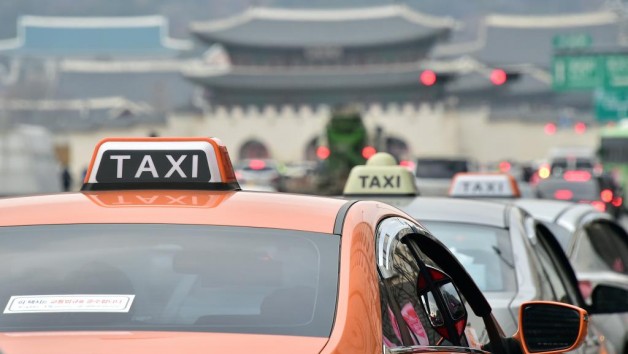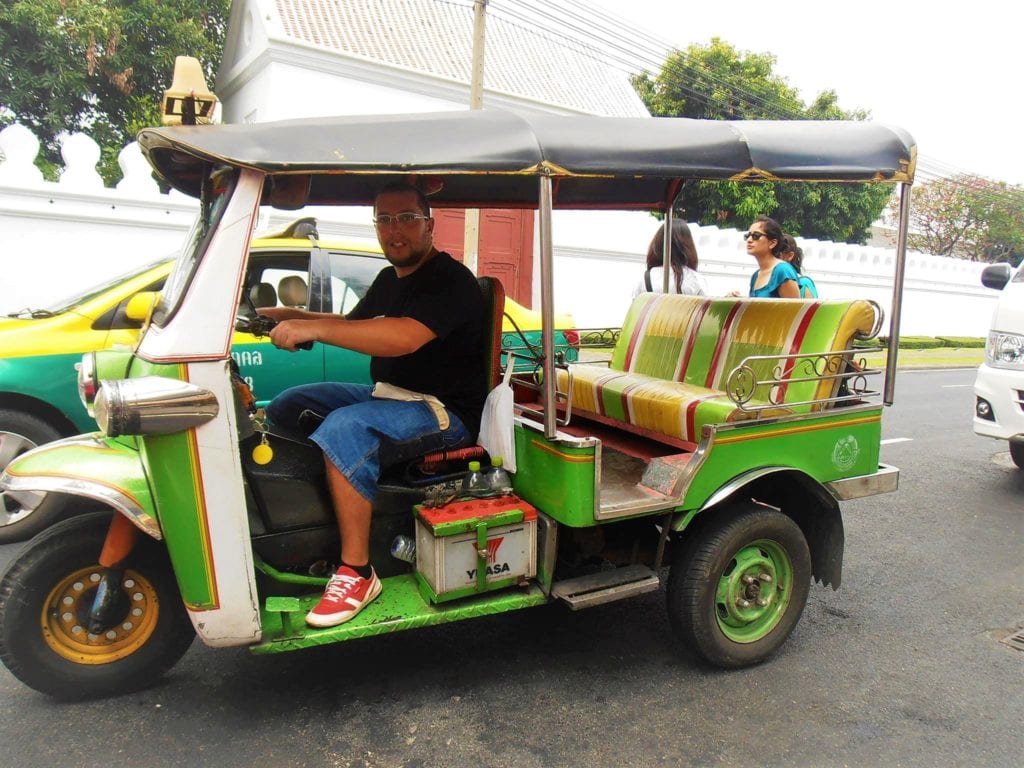.Les premières questions qu’on se pose en arrivant dans l’aéroport d’un pays inconnu est bien souvent : quel est le prix d’un taxi pour aller en ville ? Comment être sûr de ne pas me faire arnaquer ? En France, je pourrais prendre le bus ou commander un Uber, mais ici est-ce possible ?
Il m’arrive souvent de croiser des voyageurs qui, même des semaines après être arrivé, n’ont pas digéré d’avoir payé un tarif qui ne correspond pas du tout aux prix payés par les locaux.
Pourtant il existe des astuces simples et efficaces qui permettent de toujours payer le bon prix et de ne pas te poser ces questions.
Dans cet article, tu trouveras une technique qui te permettra de toujours payer le prix juste en sortant de l’aéroport et une autre pour ne pas te faire avoir dans le reste du pays visité.
Sommaire
Comment payer le bon prix au taxi, en sortant de l’aéroport ?
Lors de mon voyage en Colombie, en arrivant à Bogota, Pierre, un français que j’avais rencontré dans l’avion m’a appris une technique simple et efficace.
Nous sortons de l’aéroport, en évitant tous les faux taxis qui nous alpaguent comme dans tous les pays, dès notre arrivée. Nous arrivons devant la file d’attente des taxis officiels, qui était assez longue.

Tu peux facilement te déplacer en Uber à Colombo au Sri Lanka
Pierre sort son téléphone et me dit:
– “Je vais commander un Uber”.
Je lui réponds:
-“Ah ouai, cool”, mais dans ma tête je me dis “qu’est ce que c’est que ce bobo citadin, qui voyage sans être capable d’oublier son mode de vie parisien”.
Puis, je connecte mon cerveau. Je fais le rapprochement entre ne pas faire la queue, connaître d’avance le prix à payer et je me rappelle du concept de bonne idée.
Je me dis aussi que ma première réflexion était celle d’un beau connard. Ce n’est qu’ensuite que je réalise, une chose incroyable: “Uber existe en Colombie”. C’est pas du tout incroyable, c’est juste que je n’avais jamais pensé à utiliser Uber en dehors de Paris.

Au Vietnam, il existe même des Uber motos.
Pierre a éveillé ma curiosité et j’ai appris que la société Uber existe dans 82 pays (tu peux retrouver la liste des pays sur le site officiel), où elle est implantée principalement dans les capitales pour les trajets aéroports centre-ville.
Tu peux trouver un Uber dans des pays comme le Vietnam, le Sri Lanka ou encore le Pakistan.
Ce service n’est pas réservé uniquement aux pays développés.
Au Vietnam il existe même une catégorie Uber moto.
Bref, l’appli est la même qu’en France:
-tu réserves un véhicule,
-après quoi tu valides le tarif
-puis paies en ligne.
Tu n’as pas à te poser la question de savoir si on t’arnaques ou pas. Le tarif est défini par l’application et il est souvent égal ou inférieur au prix d’un taxi local. La seule contrainte est d’avoir accès à Internet mais les aéroports disposent souvent d’un wifi en libre accès. Si ce n’est pas le cas, tu peux acheter une puce pour ton téléphone, en arrivant à l’aéroport.
C’est utile, pas cher et ça te permettra de suivre mes conseils pour ne pas te faire arnaquer dans les villes où tu ne peux pas utiliser Uber.
Si tu trouves cette astuce utile et que tu n’as pas de compte Uber, tu peux utiliser mon code de parrainage et gagner 5€ sur ta première course.
Si tu as déjà Uber, tu peux partager cet article et donner ton code de parrainage à tes amis.
Clique ici, pour utiliser mon code de parrainage.
Comment faire quand Uber n’est pas présent ?
La technique avec Uber est efficace, mais même si l’appli est disponible dans 82 pays, elle n’est pas dans toutes les villes et il t’arrivera fréquemment que tu ne puisses pas l’utiliser.
Dans ce cas il existe une autre technique tout aussi efficace.
Avant tout il faut demander à quelqu’un de fiable les informations sur le fonctionnement des taxis dans le pays. S’il s’agit de ton trajet en sortant de l’aéroport tu peux envoyer un mail avant ton départ pour te renseigner auprès de ton auberge.
Tu peux aussi trouver ce genre d’informations sur les sites des aéroports ou encore dans les groupes facebook de voyages. Les informations à demander sont:
-est que les taxis ont des compteurs ?
-y-a-t il un forfait ou un coût kilométrique ?
-quel est le prix normal du trajet ?
En ayant ces informations en tête, tu n’as plus besoin de négocier avec le chauffeur. Demander leprix au chauffeur, négocier avec lui, sont autant d’éléments qui montrent au chauffeur que tu n’as aucune connaissance des tarifs et du pays.
Ça te place d’office comme une personne potentiellement arnaquable. Ça te met toi même dans un état d’esprit moins serein, de potentielle victime.
Monte simplement dans le taxi, indique-lui ta destination et profite de ton voyage.
En agissant ainsi tu montres au chauffeur que tu connais le pays et que tu sais combien tu dois payer le trajet.
En France quand tu prends un taxi, que tu entres dans un restaurant, tu ne demandes jamais les tarifs parce que tu les connais: tu as confiance en toi et en en tes interlocuteurs.
Tu ne cherches pas à négocier un tarif que personne d’autre ne négocie. Agis de même en voyage.
Tu peux bien sûr prendre les précautions que tu prendrais en France pour te rassurer:
Ne pas t’endormir dans un taxi.
Surveiller le compteur.
Prendre la somme exacte de la course. Tu éviteras de te faire avoir au moment où on te rend la monnaie.
Un dernier conseil, avant de partir, installe l’application gratuite maps.me sur ton téléphone. C’est un GPS qui fonctionne hors ligne, mais, l’achat d’une puce locale rendra les informations plus fiables.
C’est mon pote Rémy qui m’a montré ça en Colombie. Quand tu montes dans un taxi, ça te permet de lui montrer ta destination sur la carte et la distance. Le taxi, comprend bien qu’il ne peut pas te mentir.
Une fois la course lancée, tu vois sur le GPS si le chauffeur t’emmènes dans la bonne direction et au cas où il ne connaîtrait pas la route tu peux lui indiquer.
As-tu des histoires de taxi à raconter ? Quelle technique utilises-tu pour éviter les arnaques ?




Bonjour,
Effectivement cela peut être difficile dans certain cas d’obtenir un taxi et de payer le prix qui correspond à la course. Il faut sans doute se renseigner avant son arrivée afin de faire le bon choix et éviter les mauvaises surprises au niveau des coûts. Je ne pense pas qu’il soit nécessaire de prendre à tout prix un Uber car cela fait aussi parti du charme local.
https://www.reservation-taxi-geneve-aeroport.ch/taxi-geneve
Salut Emma, c’est sur qu’en se renseignant et en se mettant d’accord avec le chauffeur sur le prix ça évite des problème. Mais il faut pouvoir obtenir l’info
Moi je prends les taxis clandestins qui sont 3 à 4 fois moins chers que les tacos officiels pour le même service.
Ça me permet aussi d en trouver un sympa et agréable que je vais utiliser durant tout mon séjour.
Bonne idée merci